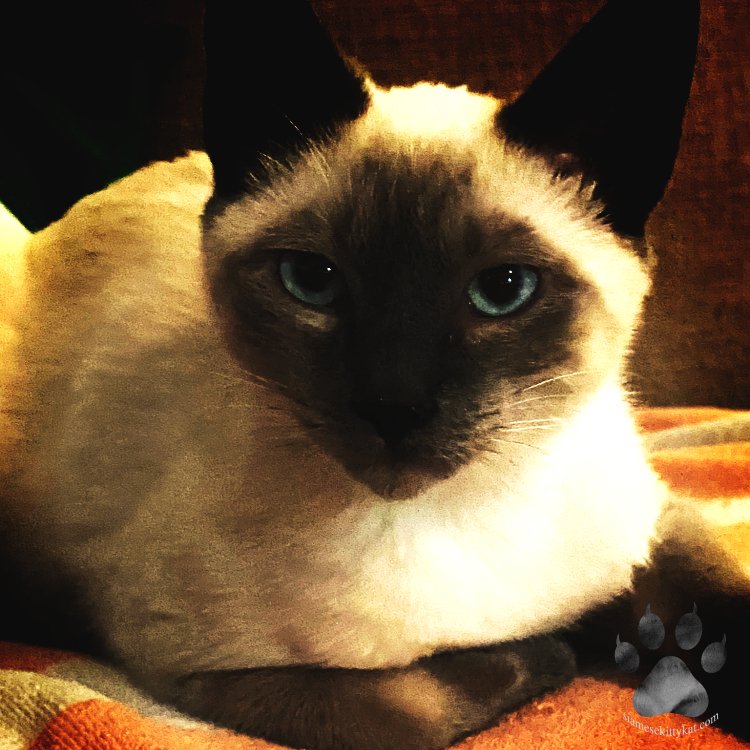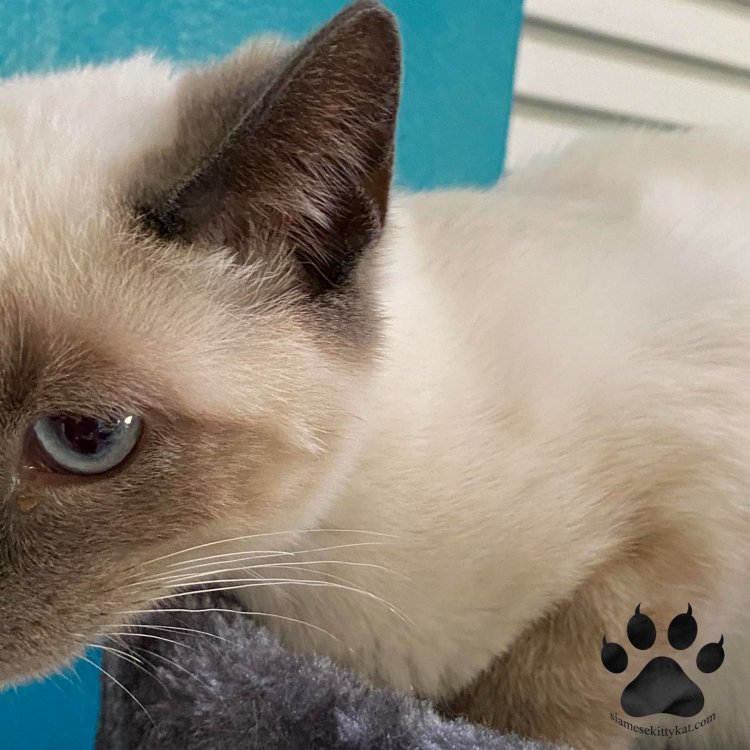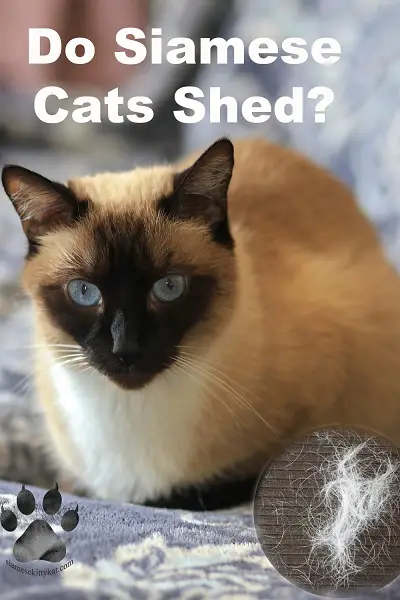Shedding is one reason why many people hesitate to adopt a pet. This is particularly true when it comes to cats. Reasons include severe allergies and an obsession with a tidy house. Why the latter group then goes and gets a dog is unclear. But I digress.
Siamese cats do not shed – much. Many people choose the Siamese breed because they shed less than most cat breeds, in addition to being crazy, intelligent, warm, and playful, of course.
All cats, except for the hairless Sphynx breed, shed hair. When it comes to Siamese kitties, their short coat means they shed a lot less than most cat breeds. However, seasonal changes will bring around shedding, as for other external factors.
Which Cat Breeds are Hypoallergenic?
The Siamese cat is hypoallergenic. This means that they are “relatively unlikely to cause an allergic reaction.”
Good news Robyn and Batman – you’re not (as) hazardous to allergy sufferers!
Robyn and Batman are the names of my Siamese cats. If you just recently got a Siamese cat and don’t know what to name them yet, click on the link for a few creative suggestions.
Here is a list of other breeds to consider if you are prone to allergies:
Other good options are:
Will A Siamese Cat Shed?

All animals with fur will shed their coat at some point in time. This includes our faithful Siamese too.
While certain environmental changes and factors will cause your Siamese to lose their coat, they are often considered a ‘hypoallergenic breed’ due to the little amount of fur they do shed.
Several reasons can explain coat shedding in Siamese cats. These include:
Let’s look at these factors in detail below:
7 Reasons Your Siamese Cat Is Shedding
1. Seasonal Changes
Cats shed their coats to maintain their ideal body temperature. Countries that see temperature changes will have kitties shedding their coats two times a year – fall and spring.
During spring, Siamese will lose their winter coats in order to keep their body temperature in check. In fall, they will grow a thicker coat to prepare themselves for the winter ahead.
You can minimize shedding by regularly brushing your cat every day during these seasons. I will highlight the ways to minimize shedding later in this article.
2. Anxiety And Stress
Stress and anxiety are the most common reasons for sudden and excessive shedding.
As we know by now, Siamese kitties are sensitive little creatures. It doesn’t take much for them to feel stressed or anxious. Moving house, a change in routine, loneliness, and a loud environment could all lead to unwanted shedding.
If you and your Siamese are going through a change, it is important to pay extra attention to your Siamese during this time. Whether that be extra pets, a few extra treats, or just spending some quality time together.
3. Improper Diet
Cats, like humans, need a healthy diet. An unbalanced diet can lead to unnecessary shedding in Siamese cats. Low-quality food can also have a negative impact on their coat, so you should talk to your vet to work out a healthy plan for your furry companion.
Proteins that enrich the skin cells and coat include linoleic acid, and Vitamin E, and Omega-3 fatty acids. It’s also important to make sure that your cat has access to clean water at all times.
4. Age
As cats age, they get less and less conscious about their appearance. This isn’t a boost in self-confidence, rather an inability to groom themselves. This could be down to arthritis, aching bones, or just old age.
Grooming is the biggest way cats keep a clean and healthy coat. Licking their fur not only keeps it clean but also removes any loose hairs (this is partly why you see them coughing up huge hairballs.)
Grooming your elderly cat will help maintain and minimize shedding.
5. Allergies And Diseases
Cats can also suffer allergic reactions towards food, dust, medication, and insect bites. Sometimes shedding can be a sign that your cat is sick.
If you are worried about excessive shedding, schedule an appointment with your vet. They will help you understand the cause of this problem.
6. Parasites
If your baby has fleas, ticks, or other parasites, it is going to be itchy, causing her to lick more. You’ll want to see your vet for a flea solution – though it is also possible for cats to be allergic to these.
For more info about parasites in Siamese cats, you can check out the research I made about the topic. Simply visit the link.
7. Sunburn
You’ve spent the entire week in the sun and you’re pulling off whole sections of skin. This can happen to your cat too. Keeping him inside is an excellent way to prevent this – and extend your time together.
Why Should You Worry About Shedding?
Allergies are triggered by proteins in the cat’s saliva, urine, and dander (or dead flakes of skin). These flakes come off with the fur your cat sheds. Cat allergies are twice as common as dog allergies.
Most sufferers only experience irritating symptoms such as those of a cold. They might sniffle, get watery eyes, and start itching when in the presence of a feline.
There are others, though, who have severe, dangerous reactions to cats. These include difficulty breathing, coughing, and wheezing. Cat allergies can also trigger an asthma attack in around 30 percent of chronic sufferers.
Are Siamese Cats Hypoallergenic?

Hypoallergenic is a very tricky term. People tend to throw this word around often, saying that many breeds of animals don’t cause allergic reactions. While it is true some certain breeds cause less of a reaction, there is no cat that is truly hypoallergenic.
All cats produce the allergen protein Fel D1, it just so happens that Siamese cats produce less Fel D1 protein than other breeds.
Besides, Siamese cats have short-haired coats, which means little shedding. If you suffer from cat allergies, a Siamese cat is a great choice.
Make sure you wash your hands after handling your cat. It could also help if you brush your cat regularly and vacuum your carpets.
You might also restrict her from sleeping in your bed.
What Can You Do About Shedding?
For long-haired cats like the Persian and Maine Coon, shedding is an unavoidable part of life. And you can’t prevent it completely, even with low-shed breeds like the Siamese. Lucky for us pet parents, shedding is a problem with a lot of marketable solutions.

You can help minimize unnecessary shedding using these tips:
Grooming
Yes, cats are self-grooming, but the longer-haired ones could use extra help. Bring in the cat brush. The Pet Grooming Glove – Gentle Deshedding Brush Glove from Amazon is my cats’ favorite:
It’s easy to wear and has comfortable “teeth” so it won’t bother your cat. Mine will actually bring me this brush!
While brushing your Siamese regularly helps with shedding, it is also a great way to bond with your Siamese. Siamese cats thrive off companionship, so you’ll most likely find them purring their heads off and having the time of their lives.
Bathing
We usually only think of dogs as needing baths. Getting a cat into the tub isn’t fun, but if you have a long-haired breed it might be worth it. Pet stores sell special pet shampoo containing natural ingredients. So if your cat licks it off in a huff, it won’t harm him.
Limit the number of baths to once a month to prevent dry skin, which would only cause more shedding. Once again, brush her using a soft brush during bath to remove the hair.
In case you need a few extra tips on how to survive from bathing a Siamese cat, I made a list of effective ones just for you. I also included steps in brushing a Siamese cat and making them like it. You can read it by clicking on the link above.
Diet
We are what we eat, and the same goes for your cat. Some foods can cause your Siamese cat to shed more than usual. These cute furry animals need a balanced diet to keep their coats healthy. Be careful when you change your cat’s diet.
They can be very sensitive and refuse to eat new foods. Speak with your Vet about the best diet for your Siamese cat before making any drastic changes.
Foods with Omega-3 and Omega-6 fatty acids improve cat skin and coat health. In addition, always leave clean drinking water for your cat. Dehydration is likely to cause dry skin which increases shedding. I give my cats salmon scraps and tuna about once a week.
Control Anxiety And Stress
Cats can suffer anxiety and stress. Siamese cats are vulnerable to these problems, given their need for attention. Unfortunately, even the slightest changes in your routine and household will stress your cat. Boredom is also a cause of stress in cats.
Keep your cat happy by getting her as many toys as possible. Spend time with your cat and make sure that she is comfortable.
One of the ways I reduce stress is to adopt or buy sibling kittens. Batman and Robyn, our siamese kitties, are brother and sister. We bought them from a Siamese Rescue group.
A year before we got Batman and Robyn, we adopted Boots, who is an American Shorthair. He is a great ‘Alpha’ for Batman and Robyn. He helps them and plays with them. He takes care of them.
Immunotherapy
As a cat lover living in a cat fancier’s world, I know many people who are allergic to their felines. Most of them just put up with minor symptoms. It is also possible to develop a resistance to a cat allergy, and some children grow out of them with time.
Another option is immunotherapy. This involves getting allergy shots once to twice a week for about six months. It is usually followed by monthly boosters for up to five years. I’ve met veterinarians who undergo these treatments for the love of their cats.
Cleaning
There are some things in life that you have to live with. Toddlers will throw food on the floor. Teenagers will toss their clothes all over their room. And cats will shed.
Some options for those neurotic about cleanliness include couch covers and vacuuming. Couch covers are also an excellent way to protect your expensive, new couch. This is one even I am particular about! And companies like Hoover and Dyson make vacuums with special bristles for fur.
All dressed up in a black blazer for a business meeting and your cat feels the spontaneous need for a cuddle? This has happened to me countless times. I always keep at least one cat brush on the vanity table by the door. Keep a backup in case you run out of sheets.
Siamese Cats Shed
Although many like to call Siamese cats hypoallergenic, they do in fact shed and they do trigger allergies. That being said, it is considerably low compared to most breeds out there.
If you suffer from allergies, it is possible to live comfortably with a Siamese as your companion. Paired with their short coats and your efforts to keep shedding to a minimum, you shouldn’t run into too many problems.
Give your house a deep clean every spring and fall to collect as much shedding as possible, and give their hair a brush every day or so. Not only will your nose, black clothes, and furniture thank you, so will your Siamese!
We gathered all the health tips tailored toward maintaining your Siamese cat’s optimal well-being. Check it out here: Siamese Cat Health: A Complete Guide
Get your FREE Siamese Cat 2025 Printable Calendar


